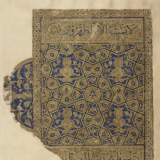History of surah The Inner Apartments

Name
Surah Al-Hujurat was named after the chambers of the wives of Prophet Muhammad. Each of them had a room at the back of the Prophet's mosque.
Period of Revelation
Surat al-Hujurat is a civil surah revealed in the ninth year of the Hijrah and comprises eighteen verses.
There was no general reason for the revelation of Surat Al-Hujurat, and what has been mentioned are the reasons for the descent in a number of its verses, namely: the reason for the revelation of the verse: (O you who have believed, do not put [yourselves] before Allah and His Messenger but fear Allah. Indeed, Allah is Hearing and Knowing). Several sayings were said about the reason for the revelation of the verse, including: The first saying: the arrival of a group of Bani Tamim at the Messenger of God - may God bless him and grant him peace - and Abu Bakr - may God be pleased with him - said under the leadership of Al-Qaqaa bin Ma'bad, and Omar Ibn Al-Khattab - may God be pleased with him - said under the leadership of Al-Aqra' bin Habis, until their voices rose and the verse was revealed. The second saying: that the Messenger of God, may God's prayer and peace be upon him, wanted to appoint a man in Madinah by going to Khaibar, so Omar ibn Al-Khattab suggested a man and the verse was revealed. The third saying: it was said that it was sent down upon a people who slaughtered before the Messenger of God, God's prayer and peace be upon him, prayed, so he ordered them to repeat the slaughter. The fourth saying: it was said that it was revealed about a people who used to precede the Messenger of God in fasting. The reason for the revelation of the verse: (O ye who believe! Raise not your voices above the voice of the Prophet, nor speak aloud to him in talk, as ye may speak aloud to one another, lest your deeds become vain and ye perceive not.) About the reason for the revelation of the verse, several sayings were said, including: The first saying: that the al-Aqra' was captured. Omar - may God be pleased with him - said not to apply it to his people, whereupon their voices rose and the verse was revealed. The second saying: it was said that it was revealed about Ali bin Abi Talib, Jaafar and Zaid n Al-Harithah - may God be pleased with them. They fought over the daughter of Hamzah when she came from Mecca with Zaid bin Al-Harithah, and the Messenger of God decided in favour of Jaafar, so the verse was revealed.
Theme and topics
Al-Fayrouzabadi mentioned that "most of the intention of the surah is to keep the commandment of God Almighty, to respect the sanctity of the elders, to be slow in matters, to avoid recklessness, to help the oppressed to beware of mocking morality, to beware of spying and backbiting, to abandon pride in lineage and gender, to favor God by obedience, and to refer to knowledge of the unseen that belongs to God Almighty."
Ibn Ashour saw that the Surah contained the following objectives:
First, to teach Muslims some of the obligatory manners of dealing with the Prophet, God's prayer and peace be upon him, in dealing with him, his speech, and his call.
Second: To teach Muslims to be truthful in what they narrate.
Third: The absolute confirmation of the transmission of the call and that this is the creation of the believers, and the avoidance of the morality of the disbelievers, the immoral and the hypocrites.
Fourth: Stimulating reforms among Muslims. For they are brothers.